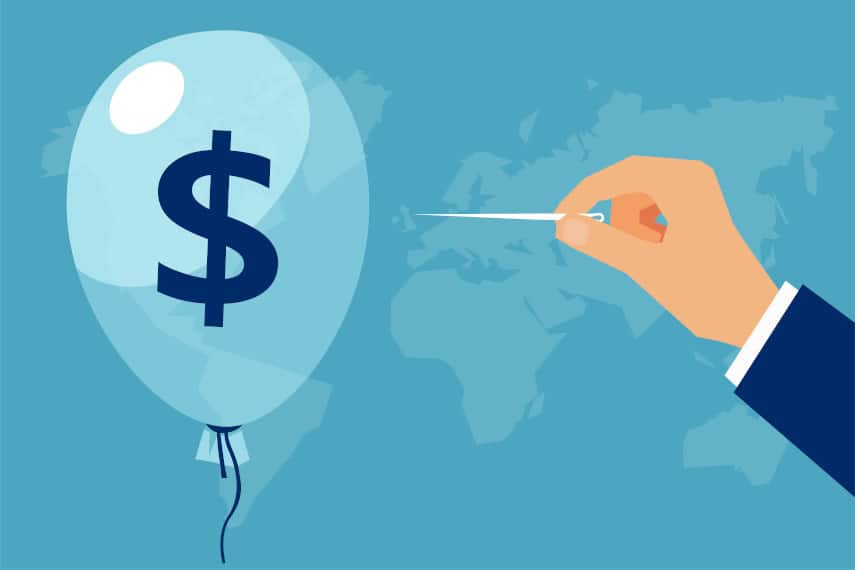6 Indicators of a Potential Recession
It seems that in the media today there are more and more mentions of the dreaded R-word: recession With growing economic uncertainty, the threat of potential recession seems to be growing as...
Economy

With all the headlines talking about how high inflation is, there’s a crisis brewing under the surface that is going largely unnoticed: the debt bubble. This debt bubble is perhaps the largest in history, one that is growing every day. And when it bursts, it could take you down with it.
Rome wasn’t built in a day, and this debt bubble wasn’t either. It’s the result of decades of deliberate policy decisions, both in terms of monetary and fiscal policy, that have built debt in both the public and private sectors up to historic proportions. Even people who should have known better have succumbed to the allure of cheap and easy money, putting themselves in a precarious financial position.
The financial crises we’ve had in the past have merely postponed the day of reckoning. Each time this debt bubble seems set to burst, central banks step in and paper things over with even more new money. But that won’t work forever.
At some point we’ll have to pay the piper, and when it happens, millions of people could be financially harmed. Here are three reasons the debt bubble bursting could wipe out your wealth.
Rising interest rates mean that the federal government now finds itself between a rock and a hard place. Issuing new debt to finance its deficit spending means paying higher interest rates, and therefore paying more money to service its existing debt of over $30 trillion.
And with the Federal Reserve vowing to shrink the size of its balance sheet, the government isn’t going to be able to rely on backdoor debt monetization through new money creation. So this leaves the government with three options to fund its spending:
An estimated 20% of US companies are so-called “zombie” companies. That means they’re only bringing in enough money to service their existing debt. So they can pay interest on their existing debt load, but they can’t do much else, including grow their business.
With interest rates rising, these companies are going to face severe problems when trying to roll over their debt. Rolling over at higher interest rates means their interest expense will rise, something they may not be able to afford. And they can’t afford to retire the principal either, meaning they may be forced into bankruptcy.
Some of these zombie companies are major firms with huge amounts of debt and large market capitalizations. Bankruptcy would not only wipe out the value of their bonds, it could also negatively impact the value of their stocks. If you’re an investor in a zombie company, whether you own bonds or stocks, the collapse of the debt bubble could negatively impact your holdings.
Household debt has increased significantly since 2008 too, and American households are now more indebted than ever. While there was a rush of spending over the past two years, that was supported by government handouts, the handouts which were funded by the Federal Reserve’s money creation.
Now that the free money has come to an end, households are confronted with the reality that their debt levels are high, inflation is high, and their wages aren’t rising enough to keep up the pace. During the next crisis, millions of households will find out the hard way that they weren’t as financially secure as they thought they were.
Hopefully you’re not one of the households facing an existential crisis due to high debt levels. But even if you’re debt-free, the impact of other households going into bankruptcy could affect you negatively.
Just remember how many people walked out on their mortgages during the 2008 crisis. Homes went into foreclosure, owners didn’t do maintenance, property values fell. If you were banking on selling your house to help fund retirement spending, a debt bubble collapse could cost you hundreds of thousands of dollars if the value of your home fell significantly.
The debt bubble has grown so massive that it’s no longer a question of if it’s going to collapse, it’s a question of when. Will the next crisis be the one that brings this house of cards crashing down?
You could take the risk that the Fed can continue printing its way out of trouble, and that this next crisis will be overcome by more easy money. But if you’re wrong, you could suffer financially.
Or you could start to prepare yourself by protecting your assets against the likelihood of a debt bubble collapse. And even if some of your assets lose value, other portions of your investment portfolio could be better protected.
Thousands of Americans just like you have already taken steps to start protecting themselves and their assets against the collapse of the debt bubble by buying gold. And many of them have done so by opening a gold IRA.
A gold IRA is like any other IRA, only that it holds physical gold coins and bars. This allows you to gain the benefits of owning gold, such as portfolio diversification, protection against inflation and stock market volatility, and long-term potential asset growth, while maintaining the same tax advantages as your current retirement accounts.
You can even fund your gold IRA with a tax-free transfer or rollover from your existing 401(k), 403(b), TSP, IRA, or similar retirement accounts. That allows you to protect the retirement savings growth you’ve already enjoyed while benefiting from the potential performance of gold during a weak economy.
Millions of people didn’t protect their savings during the 2008 crisis, and they watched in horror as stock markets lost over 50% of their value. Don’t let that happen to your investments. Call Goldco today to learn more about how gold can help safeguard your retirement dreams.

